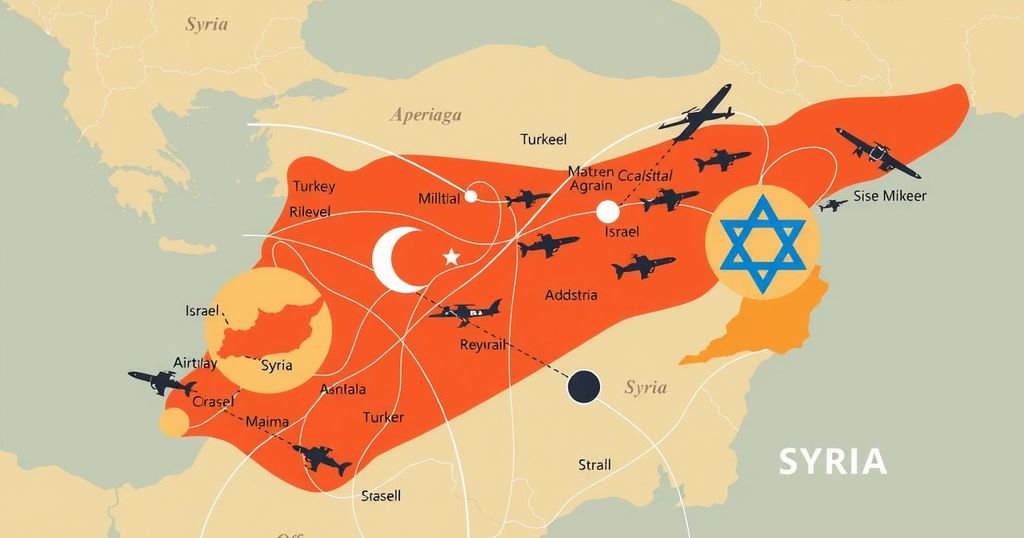Syria Post-al-Assad: Competing Turkish and Israeli Influences
The removal of Bashar al-Assad on December 8, 2024, signifies a pivotal transition for Syria. Turkiye and Israel are asserting divergent influences in the new political landscape, with Turkiye focused on limiting Kurdish autonomy and Israel seeking to counter Iranian presence. The Syrian administration under Ahmed al-Sharaa must balance relationships with these two powers while striving for internal stability and economic recovery, amid fluctuating international dynamics.
On December 8, 2024, the ousting of President Bashar al-Assad significantly altered Syria’s political landscape, creating an environment characterized by competing influences from Turkiye and Israel. These two nations, with diverging ambitions, are vying to shape Syria’s future and maintain broader regional stability in the Middle East. The shift in power dynamics heralds potential long-term repercussions for the region.
Since the onset of the Syrian civil war in 2011, Turkiye has actively influenced the conflict, initially supporting groups opposing al-Assad, such as Hayat Tahrir al-Sham. As the situation evolved, Ankara’s focus shifted towards countering the emergence of Kurdish autonomy along its southern border, which it perceives as a threat to national security. Consequently, Turkiye has intensified military engagements in northern Syria, establishing buffer zones and increasing military operations against Kurdish forces.
Recent military actions include the Manbij offensive launched by the Turkish-backed Syrian National Army, which gained over 200 square kilometers of territory. The Turkish military campaign has included drone strikes that targeted the Syrian Democratic Forces, leading to significant casualties among both militants and civilians. This campaign serves Turkiye’s overarching goal of dismantling Kurdish self-governance and ensuring territorial integrity.
In conjunction with its military efforts, Turkiye has bolstered its presence in northern Syria with over 10,000 troops and established new military outposts. This military infrastructure aims to reshape the demographic landscape in favor of pro-Turkish groups, with extensive infrastructure investments made to solidify control over these regions.
Conversely, Israel’s focus has primarily been on counteracting Iranian influence and Hezbollah operations within Syria. With al-Assad’s departure, Israel intensified military actions, conducting more than 80 airstrikes aimed at Iranian positions and Hezbollah command centers. These operations, meant to weaken Iran’s foothold and disrupt its logistical networks, signal Israel’s determination to address perceived security threats.
President Ahmed al-Sharaa’s administration is faced with the challenge of navigating relationships with both Turkiye and Israel. While Turkiye’s expanded military presence in northern Syria raises concerns, Damascus is aware of the necessity for pragmatic engagement to ensure stability and bolster economic recovery. Joint security discussions have been initiated, addressing Turkey’s military outposts, though no definitive agreements have been established.
Al-Sharaa’s approach toward Israel appears more pragmatic than that of the previous administration, emphasizing internal stability while remaining cautious of any direct diplomatic engagement. Despite the absence of open discussions, reports indicate efforts for clandestine communications regarding potential collaboration, contingent upon addressing Iranian military infrastructure within Syria.
The indirect rivalries between Turkiye and Israel heighten the complexities in Syria. While both nations do not directly engage in military conflict, their respective interests often conflict, particularly given Turkiye’s support for factions opposed by Israel. Analysts note that changing battlefield alliances may prompt future clashes and underscore the growing intelligence rivalry between the two nations.
Syria now finds itself at a pivotal juncture with significant involvement from external powers such as the United States, Iran, and Russia, complicating its path forward. As Iran revitalizes its influence and Russia maintains its military footprint supporting the previous regime, the dynamics within Syria remain fluid and multifaceted. Meanwhile, the Gulf States are reassessing their stances, offering economic aid to the new Syrian administration, albeit primarily driven by strategic interests rather than ideological affinity.
Ultimately, Syria’s future relies heavily on how effectively its new leadership manages existing internal and external pressures. The new administration must aim to balance competing interests to steer the nation toward a more stable, peaceful, and prosperous future.
The recent ousting of President al-Assad marks a significant turning point for Syria, with Turkiye and Israel positioning themselves as key players in shaping its future. Turkiye seeks to counter Kurdish autonomy while enhancing its military presence; Israel aims to thwart Iranian influence. The newly formed Syrian administration must navigate complex international dynamics while simultaneously fostering internal stability. The outcome of these efforts will determine Syria’s trajectory in the coming years.
Original Source: shafaq.com




Post Comment